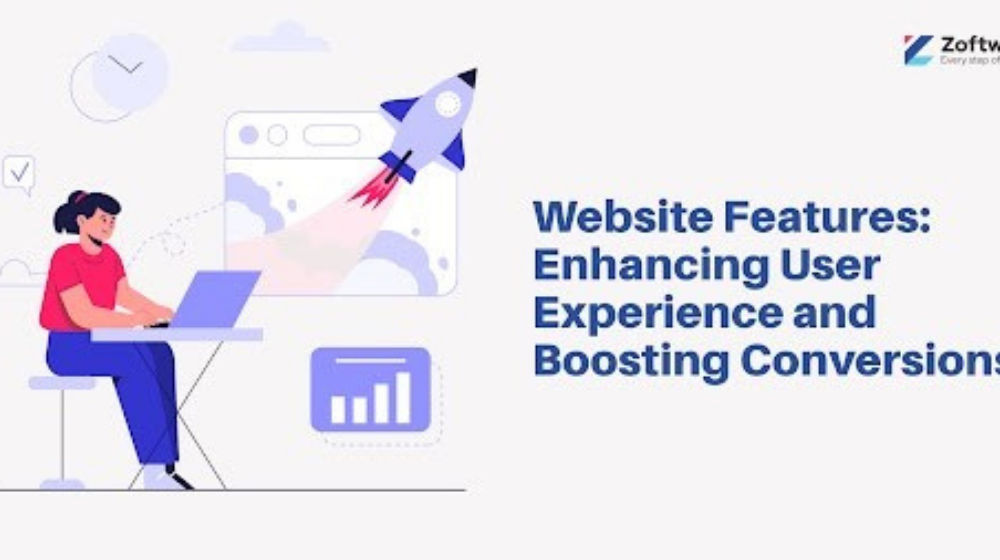Website features are the building blocks of any successful online business. They are the tools that enable businesses to connect with their customers, showcase their products and services, and ultimately drive sales. Understanding the different types of website features available is crucial for any business owner looking to create a successful online presence.
Core website features are the essential elements that every business website should have. These include a well-designed home page, an about page, and contact information. These features provide customers with a clear understanding of what the business does, how to contact them, and where to find more information. In addition, having a clear navigation menu and search function is essential for customers to easily find what they are looking for on the website.
Advanced website features, on the other hand, take a business website to the next level. These features include e-commerce functionality, customer reviews, and social media integration. These features allow businesses to sell products directly on their website, build trust with customers through reviews, and connect with customers on social media platforms.
Emerging website features are the latest trends in website design and development. These features include chatbots, voice search, and virtual reality. While not essential for every business, these features can provide a competitive advantage for businesses looking to stay ahead of the curve.
Key Takeaways
- Understanding the different types of website features is crucial for any business owner looking to create a successful online presence.
- Core website features include a well-designed home page, an about page, and contact information.
- Advanced website features include e-commerce functionality, customer reviews, and social media integration.
Understanding Website Features
A website is an essential tool for businesses and individuals to reach a wider audience and deliver information or services. However, creating a website is not enough. It is equally important to include the right features to enhance user experience and achieve the desired goals. In this section, we will discuss the top website features for 2023, best website features for 2023, and recommended website features for 2023.
Top Website Features for 2023
The following are the top website features that are expected to be popular in 2023:
- Responsive Design: With the increasing use of mobile devices, it is crucial for websites to be optimized for different screen sizes. Responsive design ensures that the website looks great on any device, be it a desktop, tablet, or smartphone.
- Personalization: Personalization allows websites to tailor content and user experience based on the user’s preferences, behavior, and location. This feature can increase engagement and loyalty.
- Chatbots: Chatbots are automated tools that can interact with users and provide assistance, answer questions, or guide them through the website. This feature can save time and improve customer satisfaction.
- Voice Search: With the rise of smart speakers and voice assistants, voice search is becoming increasingly popular. Websites that are optimized for voice search can improve their visibility and attract more traffic.
Best Website Features for 2023
While the top website features are expected to be popular, the best website features depend on the specific goals and needs of the website. The following are some of the best website features for 2023:
- Clear Navigation: Clear navigation ensures that users can easily find what they are looking for on the website. This feature can improve user experience and reduce bounce rates.
- Fast Loading Speed: Fast loading speed is crucial for user experience and search engine optimization. Websites that load quickly can improve engagement and attract more traffic.
- Social Media Integration: Social media integration allows users to share content from the website on social media platforms. This feature can increase brand awareness and drive traffic to the website.
- Secure Connection: A secure connection is essential for protecting user data and building trust. Websites that use HTTPS encryption can improve security and credibility.
Recommended Website Features for 2023
The following are some of the recommended website features for 2023:
- Contact Information: Contact information such as phone number, email address, and physical address can improve credibility and accessibility.
- Testimonials and Reviews: Testimonials and reviews from satisfied customers can increase trust and credibility.
- Call-to-Action Buttons: Call-to-action buttons such as “Buy Now” or “Sign Up” can improve conversion rates and achieve the desired goals.
- Analytics and Tracking: Analytics and tracking tools can provide valuable insights into user behavior and website performance. This feature can help optimize the website and achieve better results.
In conclusion, including the right website features can enhance user experience, improve engagement, and achieve the desired goals. The top website features for 2023, best website features for 2023, and recommended website features for 2023 should be considered when designing and developing a website.
Core Website Features
When it comes to building a website, there are certain core features that are essential for providing a positive user experience. These features include Navigation and Accessibility, Content Quality, Visual Design, Mobile Responsiveness, and Loading Speed.
Navigation and Accessibility
Navigation and accessibility are crucial for ensuring that users can easily find the information they need on a website. A website’s navigation should be intuitive and easy to use, with clear labels and a logical structure. It should also be accessible to users with disabilities, with features such as alt text for images and proper HTML markup.
Content Quality
Content quality is another important factor in a website’s success. High-quality content that is well-written, informative, and engaging can help establish a website as a trusted source of information. It can also help improve a website’s search engine rankings, as search engines tend to favor sites with high-quality content.
Visual Design
Visual design is an important aspect of website development, as it can greatly impact a user’s perception of a site. A website’s design should be visually appealing, with a clear and consistent layout, easy-to-read typography, and appropriate use of color and imagery. It should also be optimized for various screen sizes and resolutions.
Mobile Responsiveness
With more and more users accessing the internet on mobile devices, it’s essential for websites to be mobile-responsive. A mobile-responsive website is one that is designed to adapt to the screen size and resolution of a user’s device, providing an optimal viewing experience regardless of whether the user is on a desktop, tablet, or smartphone.
Loading Speed
Finally, loading speed is a critical factor in website success. A website that takes too long to load can lead to a high bounce rate, as users are likely to become frustrated and leave the site. To ensure optimal loading speed, a website should be optimized for performance, with compressed images, minified code, and a content delivery network (CDN) if necessary.
In summary, Navigation and Accessibility, Content Quality, Visual Design, Mobile Responsiveness, and Loading Speed are all essential features of a successful website. By focusing on these core features, website developers can create sites that are easy to use, informative, visually appealing, and accessible to users across a variety of devices.
Advanced Website Features
When it comes to creating a website, there are certain features that are essential for a functional and user-friendly experience. However, there are also advanced website features that can take your website to the next level and provide a more personalized and secure experience for your visitors. In this section, we will discuss some of these advanced website features and how they can benefit your website.
Search Engine Optimization
Search Engine Optimization (SEO) is the process of optimizing your website to rank higher in search engine results pages (SERPs). This is important because the higher your website ranks, the more likely people are to find it when they search for relevant keywords. Some advanced SEO features include:
- Schema markup: This is a type of code that helps search engines understand the content on your website and can improve the appearance of your search engine listings.
- Accelerated Mobile Pages (AMP): AMP is a Google-backed project that allows your website to load faster on mobile devices, which can improve your search engine rankings.
- Voice search optimization: As more people use voice search to find information online, optimizing your website for voice search can help you rank higher in voice search results.
User Personalization
Personalizing the user experience on your website can help improve engagement and conversions. Some advanced user personalization features include:
- Dynamic content: This allows you to display different content to different users based on their behavior or preferences.
- Recommendation engines: These use data to suggest products or content that a user might be interested in based on their past behavior.
- Personalized emails: Sending personalized emails to users based on their behavior or preferences can help improve open rates and conversions.
Social Media Integration
Integrating your website with social media can help increase engagement and drive traffic to your website. Some advanced social media integration features include:
- Social login: Allowing users to sign in to your website using their social media accounts can make the sign-up process faster and easier.
- Social sharing: Adding social sharing buttons to your website can encourage users to share your content on social media.
- Social proof: Displaying social proof, such as social media followers or user reviews, can help build trust and credibility with your audience.
Security Measures
Ensuring the security of your website and user data is essential for building trust with your audience. Some advanced security measures include:
- Two-factor authentication: This adds an extra layer of security to user accounts by requiring a second form of authentication, such as a code sent to their phone.
- SSL encryption: SSL encryption ensures that data transmitted between the user’s browser and your website is secure and cannot be intercepted by third parties.
- Firewalls and malware scanning: These can help protect your website from hacking attempts and malware infections.
Analytics Integration
Integrating analytics into your website can help you track user behavior and make data-driven decisions to improve your website’s performance. Some advanced analytics features include:
- Heatmaps: These show you where users are clicking and scrolling on your website, which can help you optimize your design and content.
- Conversion tracking: This allows you to track specific actions that users take on your website, such as form submissions or purchases.
- A/B testing: This involves testing different versions of your website to see which performs better in terms of user engagement or conversions.
Overall, incorporating advanced website features can help you provide a better user experience, improve your search engine rankings, increase engagement, and build trust with your audience.
Emerging Website Features
As technology continues to advance, website features are constantly evolving. Here are a few emerging website features that businesses should consider implementing to stay ahead of the curve:
Artificial Intelligence
Artificial Intelligence (AI) is becoming increasingly popular in website design. AI-powered chatbots can provide 24/7 customer support, helping businesses save time and resources. Additionally, AI can be used to personalize website content based on user behavior, improving the overall user experience.
Virtual Reality
Virtual Reality (VR) is a cutting-edge technology that is starting to make its way into website design. By using VR, businesses can create immersive experiences for their users. For example, a real estate company could create a VR tour of a property, allowing potential buyers to explore the space without leaving their homes.
Voice Search Optimization
Voice search is becoming more prevalent as people use voice assistants like Siri, Alexa, and Google Assistant to search the web. Websites that are optimized for voice search can improve their search engine rankings and provide a better user experience for those who prefer to use their voice instead of typing.
Progressive Web Apps
Progressive Web Apps (PWAs) are a type of website that can be installed on a user’s device like a native app. PWAs offer faster load times, offline functionality, and push notifications, making them a great option for businesses looking to provide a seamless user experience across all devices.
Incorporating these emerging website features can help businesses stay ahead of the competition and provide a better user experience for their customers.
Conclusion
In conclusion, creating a website with the right features is crucial for businesses to succeed in 2023. The top website features for 2023 include mobile responsiveness, fast loading speed, and easy navigation. These features ensure that users have a positive experience when accessing the website, which can lead to increased engagement and conversions.
Other recommended website features for 2023 include personalized content, chatbots, and voice search optimization. Personalized content can help businesses connect with their audience on a deeper level, while chatbots can provide 24/7 support and improve customer satisfaction. Voice search optimization is also becoming increasingly important as more people use voice assistants to browse the internet.
If you are looking forward to growing your business exponentially in the Middle East by leveraging digital transformation then sign up on Zoftware.





